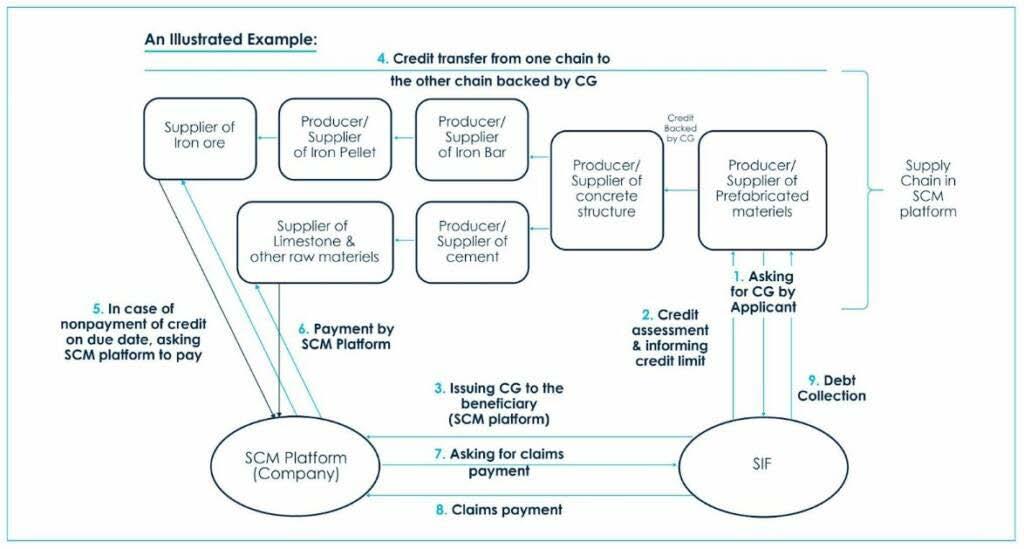
4 minute read
4.7 Credit guarantees for supply chain platforms: A new way to help SMEs
For many SMEs, the financing gap is always a major concern. It is reported that financing shortages count for more than half of SMEs’ problems. This issue is important for national policymakers, and financiers, as SMEs are major drivers of economic growth, employment, and social development in all economies, but especially in developing countries.
In recent years, Supply Chain Finance (SCF), has been emphasised as one of the preferred ways of financing, because of its lower costs and physical action-driven nature, as well as its flexibility and variation in providing different solutions, which differs from traditional trade finance techniques. SCF can also support Supply Chain Management (SCM) which in turn has gained prominence since the COVID-19 crisis.
A new product to help SMEs
Having the above-mentioned points in mind, the “Small Industries Guarantee Fund of Iran” (SIF), a governmental credit guarantee fund for supporting small manufacturers (as a major part of SMEs), has recently developed a product called “Credit Guarantee for Supply Chain Platforms”.

In this product, the Applicant of the credit guarantee is a manufacturer, a member of the Supply Chain Platform. The beneficiary of the credit guarantee is a company owning a SCM platform (in some cases SCF platform) for domestic transactions, and the Guarantor is SIF.
How does it work?
After receiving the application from the manufacturer, SIF performs a credit assessment on the manufacturer (first chain), then according to the credit limit approved, SIF issues the credit guarantee for the beneficiary, i.e. company owning the SCM platform.
The credit backed by SIF’s guarantee is transferred from one chain to the other chain reaching the raw material supplier. The credit might be divided among different chains, i.e. suppliers.
In case of non-payment on the due date by the first chain, the SCM platform makes the indemnification for any chain asking for the payment (usually the raw material supplier at the end of supply chains), and then it refers to SIF for indemnification.
SIF pays the claim to the SCM platform and then goes to the first manufacturer for debt collection. In case of nonpayment, SIF compensates for the collaterals received from the manufacturer on the first day.
Advantages of this new product
There are many advantages to using SCF, but the new product has numerous benefits, particularly for manufacturers:
1. It helps the supply chains to perform better and improves relations among suppliers and buyers, as well as helping the businesses to grow;
2. There is better access to finance, especially for Small Manufacturing Companies, which are usually nonbankable and credit-starved, mostly due to their weaker collaterals or their small size, making them unattractive to the banks. This will help the working capital optimisation and better liquidity for all chains;
3. There is no need for financing from the banking system, and the credits among suppliers and buyers will be used;
4. There is no need to use trade finance instruments and bear the related costs. Just the credit wallet in SCM/SCF platform is used. Occasionally, BPO will be utilised as well.
5. The transactions in the supply chain will be done based on credit, and no cash is needed;
6. All the processes of supply contracts and credit transfers can be monitored via the SCM platform, so the guaranteed credit cannot be used outside the intended supply chain, and the guarantee is driven by a physical action of selling goods/services;
7. When the beneficiary is the SCM platform, there is no need to issue a credit guarantee for each transaction between a single supplier-buyer when the credit is transferred, which means a huge reduction in the workload;
8. Buying on credit terms will gradually build up a good credit portfolio for the member company with the fund;
9. Overall, it decreases the cost of financing for the whole chain.
For SIF, the major advantage is a lower default ratio compared to the traditional Supplier Credit Guarantee. It also helps with understanding that the credits are used in the manufacturing process, which is the fund’s major mandate.
What else needs to be considered?
As the SCM platform becomes the beneficiary, it should have full legal authority from member buyers/suppliers to ask for nonpayment proofs, claim from SIF, and receive indemnification. According to Mohsen Serajzadeh, MOB and supervisor to SCF Project in SIF, there is also another option. A pool of funds is created with the subscription fee paid by members of the SCM platform, which supports the risks accepted by SIF or the risks covered by the SMC platform over the approved limit of SIF. Meanwhile, if a member contributes more to the pool, they
“Small Industries Investment Guarantee Fund, affiliated with Iran’s Ministry of Industry, Mine, and Trade, is a body designed to help small industries in Iran have better access to finance and investment, assisting them in their growth and job creation.

For the suppliers and buyers inside the supply chain, SIF, along with the new Credit Guarantee for Supply Chain Platforms, can also issue its traditional Credit Guarantee with the beneficiary of banks, in case they wish to raise finance from the banking system for their fixed or working capital.”
Mohammad Hossein Moghiseh, Chairman & CEO of SIF
will receive a higher credit limit. Further consideration is needed for performance risk, AML, legal and IT issues.
SIF is close to finishing the “Credit Guarantees for Supply Chain Platforms”, and is on the verge of offering this service on one of the platforms, after completion of IT requirements on SCM platform.
After market research into SME Credit Guarantee Institutions and Export Credit Agencies, however, the research could not find any similar products. SIF welcomes any exchange of information with professionals on this new product.










